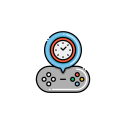I played this game as a kid when it released and remembered not liking it very much. I remembered almost nothing about it. I didn’t remember a single boss fight or temple, like it was really wiped from my mind.
I wanted to play through it again because people always talk about how they love this game, but I found it really lacking and annoying at times.
Having to redo things each time you resets time made the game feel more like a chore. I understand that your going back in time, but it did not make for good gameplay.
I made it to the moon, but I’m burnt out at this point and a little under powered. I did not do any of the side quests as having to redo a bunch of stuff sounds terrible. I don’t want to get 3/4th through a side quest only to have to reset time.
Before resetting, I have to deposit money, then reset, then stock up my items again, and redo all the things I need to do to get back to where I was.
I have to admit that it is really original and a cool concept, but it does not work in practice.
I still put oot and wind Waker at the top of the 3d Zelda’s. (Not counting the switch games)
At this point, I’ll boot up oot and play through that again. I vividly remember child links part of the game and a decent amount of adult link. After that, I’ll try the master quest. I remember that being difficult and I never completed it when I was a kid.


I love Majora’s Mask. It’s unironically genius, particularly for an N64 game. Not… fun to play, admittedly.
The worldbuilding, storytelling, atmosphere, psychology, writing and (partly) soundtrack are incredibly good, though, and makes MM one of my favorite games that I never really feel like playing. I don’t think it’s all that good as a Zelda game, but it’s more than good enough to deliver the awesome parts.
I’ll never not cry like a little removed about the Anju/Kafei story - love corrupted by random shit luck and greed, turned into confusion, doubt, loss and insecurity. If you follow the quest all the way to the end and manage to pull it all together, they’re still stoically accepting their death - as long as they get to be together and are no longer worried they’ve been stood up or won’t be accepted by their spouse.
The rest of the game is basically more of that, fixing sometimes heartbreaking problems caused by the mask - one at a time, several at a time, dealing with setbacks and resets. Every plotline you resolve does revert back to the miserable start, but you’re also left with something “lasting” for each one, until you finally clear the game.
The denialism and eventual panic of the townspeople is really well done, the Clock Town music taking different forms depending on the day, where the third day is explicitly dark and ominous. People are panicking, going about their business as usual, taking refuge, worrying about unsettled scores, blustering and arguing…
It’s a bit of a trippy experience wrapped in not-always-riveting gameplay, but the parts that work work extremely well, and if you’re in the right frame of mind the game can get pretty philosophical.